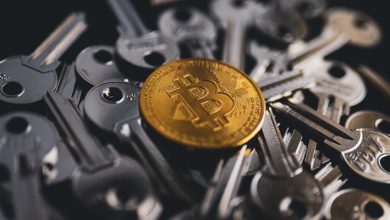Exploring Decentralized Finance: A Beginner’s Perspective

- Understanding the basics of decentralized finance (DeFi)
- The rise of DeFi in the financial world
- How DeFi is revolutionizing traditional finance
- Exploring the key components of decentralized finance
- Navigating the risks and benefits of DeFi
- A beginner’s guide to getting started with decentralized finance
Understanding the basics of decentralized finance (DeFi)
Decentralized finance (DeFi) is a revolutionary concept that aims to transform the traditional financial system by leveraging blockchain technology and smart contracts to provide financial services without the need for intermediaries. In simple terms, DeFi allows individuals to access a wide range of financial products and services such as lending, borrowing, trading, and more directly from their digital wallets.
One of the key principles of DeFi is decentralization, which means that there is no central authority or middleman controlling the system. Instead, transactions are executed automatically through smart contracts, which are self-executing contracts with the terms of the agreement directly written into code. This eliminates the need for trust between parties and reduces the risk of fraud or manipulation.
By removing intermediaries, DeFi aims to make financial services more accessible, transparent, and efficient for everyone. Users retain full control over their assets and can interact with the DeFi ecosystem without having to rely on banks or other traditional financial institutions. This level of autonomy and empowerment is one of the main reasons why DeFi has gained so much popularity in recent years.
The rise of DeFi in the financial world
Decentralized Finance (DeFi) has been gaining significant traction in the financial world in recent years. DeFi refers to a set of financial services and applications that are built on blockchain technology, allowing for peer-to-peer transactions without the need for traditional intermediaries such as banks or brokers.
One of the key drivers behind the rise of DeFi is the growing interest in blockchain technology and cryptocurrencies. As more people become familiar with the benefits of decentralization, they are increasingly turning to DeFi platforms to access a wide range of financial services, including lending, borrowing, trading, and investing.
Another factor contributing to the popularity of DeFi is the potential for high returns. Many DeFi platforms offer users the opportunity to earn interest on their cryptocurrency holdings or participate in liquidity pools to generate passive income.
Furthermore, DeFi is seen as a more inclusive and accessible form of finance, as it allows individuals from anywhere in the world to participate in the global economy without the need for a traditional bank account or credit history. This has opened up new opportunities for individuals in underserved communities to access financial services.
Overall, the rise of DeFi in the financial world represents a significant shift towards a more decentralized and democratized financial system, providing individuals with greater control over their assets and financial activities.
How DeFi is revolutionizing traditional finance
Decentralized Finance, also known as DeFi, is transforming the traditional financial industry by providing an alternative to the centralized systems that have long dominated the sector. DeFi leverages blockchain technology to create a more open and inclusive financial ecosystem that is accessible to anyone with an internet connection.
One of the key ways in which DeFi is revolutionizing traditional finance is through its emphasis on decentralization. Unlike traditional financial institutions, which rely on centralized authorities to facilitate transactions and manage assets, DeFi platforms operate on a peer-to-peer basis, allowing users to interact directly with each other without the need for intermediaries.
Another way in which DeFi is reshaping traditional finance is through its focus on transparency. Because transactions on DeFi platforms are recorded on a public blockchain, users can easily verify the integrity of the system and ensure that their funds are being handled securely. This level of transparency is a stark contrast to the opacity that often characterizes traditional financial institutions.
Exploring the key components of decentralized finance
Decentralized finance, also known as DeFi, is a revolutionary concept that is reshaping the traditional financial system. It is built on blockchain technology and aims to eliminate the need for intermediaries such as banks or brokers. In DeFi, financial services are decentralized and accessible to anyone with an internet connection.
There are several key components that make up decentralized finance. These components work together to create a new financial ecosystem that is more transparent, efficient, and inclusive. Some of the key components of decentralized finance include:
1. Smart Contracts: Smart contracts are self-executing contracts with the terms of the agreement directly written into code. They automatically execute actions when certain conditions are met, without the need for intermediaries.
2. Decentralized Exchanges: Decentralized exchanges allow users to trade cryptocurrencies directly with one another, without the need for a centralized exchange. This reduces the risk of hacking and provides users with more control over their funds.
3. Decentralized Lending Platforms: Decentralized lending platforms allow users to borrow and lend cryptocurrencies without the need for a traditional financial institution. This provides greater access to credit for individuals who may not have access to traditional banking services.
4. Stablecoins: Stablecoins are cryptocurrencies that are pegged to a stable asset, such as the US dollar. They provide a way to hedge against the volatility of other cryptocurrencies while still utilizing the benefits of blockchain technology.
5. Governance Tokens: Governance tokens are tokens that give holders the right to vote on decisions related to a decentralized protocol. This gives users a say in the direction of the protocol and helps to ensure its security and integrity.
By exploring these key components of decentralized finance, beginners can gain a better understanding of how this innovative technology is changing the way we think about finance. It is important to stay informed and educated in order to take full advantage of the opportunities that DeFi has to offer.
Navigating the risks and benefits of DeFi
When delving into the realm of decentralized finance (DeFi), it is crucial to carefully navigate the risks and benefits associated with this innovative financial ecosystem. DeFi offers a plethora of opportunities for users to engage in various financial activities without the need for traditional intermediaries. However, it is essential to exercise caution and due diligence when participating in DeFi protocols to mitigate potential risks.
One of the key benefits of DeFi is the ability to access a wide range of financial services, such as lending, borrowing, trading, and yield farming, in a decentralized and permissionless manner. This can provide individuals with greater financial inclusion and autonomy, allowing them to take control of their assets and participate in the global financial market.
On the flip side, the decentralized nature of DeFi also poses certain risks that users should be aware of. Smart contract vulnerabilities, impermanent loss, rug pulls, and regulatory uncertainty are some of the risks that can impact users’ funds and investments. It is crucial for individuals to conduct thorough research, seek advice from experienced DeFi users, and only invest what they can afford to lose.
Furthermore, it is essential to stay informed about the latest developments and best practices in the DeFi space to make informed decisions and protect one’s assets. Engaging with the community, joining forums and social media groups, and keeping up to date with reputable DeFi projects can help users stay ahead of potential risks and make the most of the opportunities presented by decentralized finance.
In conclusion, while DeFi offers exciting possibilities for financial innovation and empowerment, it is essential to approach this space with caution and awareness of the risks involved. By staying informed, conducting thorough research, and seeking advice from experienced users, individuals can navigate the world of decentralized finance more confidently and make the most of the benefits it has to offer.
A beginner’s guide to getting started with decentralized finance
Decentralized finance, also known as DeFi, has gained significant popularity in recent years as a new way to access financial services without the need for traditional intermediaries. For beginners looking to get started with DeFi, it can seem like a complex and daunting space. However, with the right guidance, navigating the world of decentralized finance can be both rewarding and profitable.
One of the first steps to getting started with DeFi is to familiarize yourself with the basic concepts and terminology. Understanding key terms like smart contracts, liquidity pools, decentralized exchanges, and yield farming can help you make informed decisions when participating in DeFi protocols. Taking the time to research and learn about these concepts will set you up for success in the decentralized finance space.
Once you have a good understanding of the fundamentals, the next step is to choose a suitable wallet to store your cryptocurrency assets. There are various types of wallets available, including hardware wallets, software wallets, and web-based wallets. It’s essential to select a wallet that offers robust security features to protect your funds from potential hacks or breaches.
After securing a wallet, the next step is to select a DeFi platform to start interacting with decentralized applications (dApps) and protocols. Popular DeFi platforms like Uniswap, Compound, and Aave offer a wide range of financial services, including lending, borrowing, trading, and staking. By exploring different DeFi platforms, you can find opportunities to earn passive income and maximize your returns on investment.
As you start participating in DeFi protocols, it’s crucial to practice good risk management and due diligence. DeFi platforms can be highly volatile, and there is always a risk of smart contract bugs or vulnerabilities. By diversifying your investments, setting stop-loss orders, and staying informed about the latest developments in the DeFi space, you can minimize potential losses and protect your capital.
In conclusion, getting started with decentralized finance can be a rewarding experience for beginners willing to learn and explore this innovative space. By understanding the basics, choosing a secure wallet, selecting the right DeFi platforms, and practicing good risk management, you can unlock the full potential of DeFi and take advantage of the various financial opportunities it offers.



